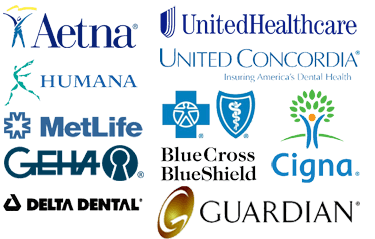Dental Insurance
We accept ALL PPO Dental Insurance and Select Medicare Advantage Plans
We are committed to ensuring you receive the maximum benefits allowable under your dental insurance plan. And as a courtesy, we will file your dental insurance claims on your behalf. Please call our office to verify eligibility and coverage.


We Accept ALL PPO Dental Insurance Plans
Please Call Our Office to Verify Eligibility and Coverage
We do our best to estimate your portion of the payment before you leave our office, but with literally hundreds of insurance companies and thousands of individual plans it’s simply impossible for us to know all of them. And most carriers refuse to release all the details of their plans. They change policies and reimbursements constantly without notice. That’s why it’s so important for you to know your plan and take charge of your health!
Understanding Dental Insurance
To begin, we would like to highlight a misconception: dental insurance is not designed to pay for all of your dental care. Most contracts have yearly limits, treatment limitations and/or various degrees of “co-payments”. All levels of payment by insurance companies, including allowed fees, usual, customary, and reasonable (UCR) are governed by the premiums paid. They have nothing to do with the actual fee for the services rendered. Our fees are based upon a combination of our costs, our time, and our consistent dedication to providing our patients with the highest quality of dental care. Thus, there is often a discrepancy between the amount covered under your policy’s UCR schedule, and the actual cost of the procedure. The discrepancy is the patient’s responsibility.
The treatment recommended by our practice is never based on what your insurance company will pay, as your oral health care and accompanying treatment should not be governed by your insurance company contract. Thus, it should be understood that the dental insurance contract is between the insurance company and the patient. If you are unclear as to whether a particular procedure is covered by your carrier, please submit a pre-estimate for treatment before scheduling. We hope this information has been helpful. Please take the time to review your insurance policy’s nuances thoroughly so that we may best serve you.
As always, feel free to contact any member of our staff for clarification on services, billing and insurance
Frequently Asked Questions
Dental insurance isn’t really insurance (a payment to cover the cost of a loss) at all. It is actually a monetary benefit typically provided by an employer to help their employees pay for routine dental treatment. The employer buys a plan based on the amount of the benefit and how much the premium costs per month. Most benefit plans are only designed to cover a portion of the total cost.
Because your insurance coverage is between you, your employer and the insurance carrier, your dentist does not have the power to make your plan pay. If your insurance does not pay, you are responsible for the total cost of treatment. Sometimes a plan may pay if patients send in a claim for themselves. The Employee benefits Coordinator at your place of employment may be able to help. Patients may also lodge complaints with the state Insurance Commission.
Dentists deal with thousands of plans and hundreds of types of treatments each year. Most carriers refuse to release the details of their plans. They change policies and reimbursements constantly and without notice.
That 100% is usually what the insurance carrier allows as payment toward the procedure, not what your dentist or any other dentist in your area may actually charge. For example, say your dentist charges $80.00 for an examination, not including x‐rays. Your carrier may allow $60.00 as the 100% payment for that examination, leaving $20.00 for you to pay.
Many carriers refer to their allowed payments as UCR, which stands for usual, customary and reasonable. However, usual, customary and reasonable does not really mean exactly what it seems to mean. UCR is a listing of payments for all covered procedures negotiated by your employer and the insurance company. This listing is related to the cost of the premiums and where you are located in you city and state. Your employer has likely selected and allowed payment or UCR payment that corresponds to the premium cost they desire. UCR payments could be accurately called negotiated payments.
Typically there is always a portion that is not covered by your benefit plan.
It does not mean that your dentist is charging too much. Remember that what insurance carriers call UCR is really just what your employer and the insurance company have negotiated as the amount that will be paid toward your treatment. It us usually much less than what any dentist in your area might actually charge for a dental procedure.
Maximums limit what a carrier has to cover each year. Amazingly, despite the fact that costs have steadily increased, annual maximum levels for dental care have not changed since the 1960’s.
Usually a dentist on the list has agreed to a contract with the benefit plan. These contracts have restrictions and requirements. If you choose a dentist on the list, you typically pay less toward your dental care than if you choose a dentist not on the list. If your dentist is not on the list this does not mean that something is wrong with the dentist or the office.
To save money. Your dentist may recommend a crown, with your insurance only offering a benefit toward a filling. This does not mean you have to accept the filling. The good news is that some benefit will be paid: the bad news is that more of the fee will be your responsibility. Remember that your dentist’s responsibility is to prescribe what is best for you. The insurance carriers responsibility is to control payments.
Your plan contract specifies how many of certain types of procedures it will consider annually. It limits the number of x‐rays, cleanings, etc. covered because these are the types of treatments that many people have frequently.
Dental plans used to work together. However, many times you will get little or no coverage from a second plan. Consider any extra benefit an unexpected gift.
Contact US
Address
Business Hours
| Mon, Wed | 8:30 AM – 5:00 PM |
| Tue, Thurs | 11:00 AM – 7:00 PM |
| Saturday | 8:00 AM – 2:00 PM |

